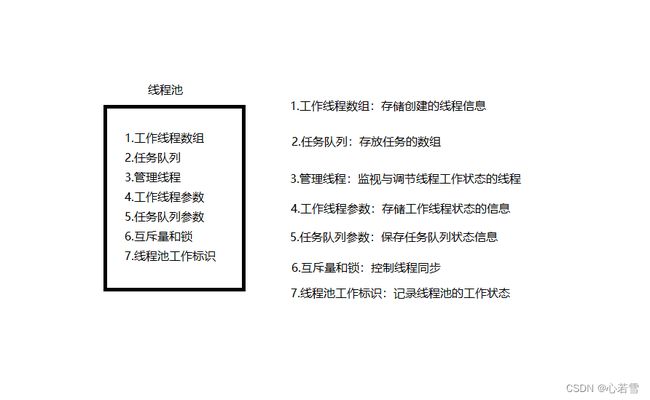
#ifndef _THREADPOOL_H_
#define _THREADPOOL_H_
#define EXIT_NUM 10
#define ADD_NUM 10
#include
#include
#include
#include
#include
#include
//任务结构体
typedef struct Task
{
void (*function)(void* arg);
void* arg;
}task;
//线程池
typedef struct ThreadPool
{
task* task_list; //任务队列
int task_front; //任务队列头
int task_behind; //任务队列尾
int task_num; //队列中任务数
int task_capacity; //任务队列容量
pthread_t manage_thread; //管理者线程
int min_thread_num; //最小线程数
int max__thread_num; //最大线程数
int live_thread_num; //存活线程数
int busy_thread_num; //工作线程数
int exit_thread_num; //要退出的线程数
pthread_mutex_t pool_lock; //线程池锁
pthread_mutex_t busy_num_lock; //忙线程锁
pthread_cond_t can_add; //任务队列可添加
pthread_cond_t can_work; //空闲线程可工作
bool shutdown; //是否销毁线程池标志
}thread_pool;
//创建线程池
thread_pool* create_thread_pool(int pthread_min, int pthread_max, int task_capacity);
//添加任务
int add_task(thread_pool* pool,void(*function)(void*),void* arg);
//管理者线程函数
void* manage(void* arg);
//工作者线程函数
void* worker(void* arg);
//查询忙线程数
int query_busy(thread_pool* pool);
//查询存活线程数
int query_live(thread_pool* pool);
//修改线程池运行状态
void shutdown_pool(thread_pool* pool);
//释放资源
void exit_pool(thread_pool* pool);
#endif // _THREADPOOL_H_
#include"ThreadPool.h"
//创建线程池
thread_pool* create_thread_pool(int pthread_min, int pthread_max, int task_capacity)
{
//开辟线程池
thread_pool* pool = (thread_pool*)malloc(sizeof(thread_pool));
if (pool == NULL){
printf("create thread_pool error!\n");
return NULL;
}
memset(pool, 0, sizeof(thread_pool));
//创建任务队列
pool->task_list = (task*)malloc(sizeof(task)*task_capacity);
if(pool->task_list == NULL){
printf("create task_list error!\n");
free(pool);
pool = NULL;
return NULL;
}
memset(pool->task_list, 0, sizeof(task)*task_capacity);
//初始化锁和条件变量
pthread_mutex_init(&pool->pool_lock, NULL);
pthread_mutex_init(&pool->busy_num_lock, NULL);
pthread_cond_init(&pool->can_add, NULL);
pthread_cond_init(&pool->can_work, NULL);
//初始化任务队列
pool->task_capacity = task_capacity;
pool->task_front = 0;
pool->task_behind = 0;
pool->task_num = 0;
//初始化工作线程信息
pool->min_thread_num = pthread_min;
pool->max__thread_num = pthread_max;
pool->live_thread_num = 0;
pool->exit_thread_num = 0;
pool->busy_thread_num = 0;
//线程池工作信息
pool->shutdown = false;
//创建管理线程
pthread_create(&pool->manage_thread, PTHREAD_CREATE_JOINABLE, manage, pool);
//创建初始工作线程 (初始工作线程 = 最小工作线程)
pthread_mutex_lock(&pool->pool_lock);
pthread_t thread;
for (int i = 0; i < pthread_min; i++){
pthread_create(&thread, PTHREAD_CREATE_JOINABLE, worker, pool);
pool->live_thread_num++;
}
pthread_mutex_unlock(&pool->pool_lock);
return pool;
}
//释放资源
void exit_pool(thread_pool* pool) {
thread_pool* p = pool;
int live_num = 0;
do {
pthread_mutex_lock(&pool->pool_lock);
live_num = pool->live_thread_num;
if (live_num > 0) {
pool->exit_thread_num = pool->live_thread_num;
pthread_cond_signal(&pool->can_work);
}
pthread_mutex_unlock(&pool->pool_lock);
} while (live_num > 0);
//释放任务队列
while (pool->task_num != 0) {
if (pool->task_list[pool->task_front].arg != NULL) {
free(pool->task_list[pool->task_front].arg);
pool->task_list[pool->task_front].arg = NULL;
}
pool->task_front = (pool->task_front + 1) % pool->task_capacity;
pool->task_num--;
}
//释放堆内存
free(pool->task_list);
pool->task_list = NULL;
//销毁锁和条件变量
pthread_mutex_destroy(&pool->busy_num_lock);
pthread_mutex_destroy(&pool->pool_lock);
pthread_cond_destroy(&pool->can_add);
pthread_cond_destroy(&pool->can_work);
}
//添加任务
int add_task(thread_pool* pool,void(*function)(void*), void* arg)
{
pthread_mutex_lock(&pool->pool_lock);
while (pool->task_num == pool->task_capacity && pool->shutdown == false){ //任务队列满 阻塞等待can_add条件变量
pthread_cond_wait(&pool->can_add, &pool->pool_lock);
}
if (pool->shutdown == true) { //线程池关闭 不再添加任务
if (arg != NULL) {
free(arg);
arg = NULL;
}
return -1;
}
//向任务队列中添加任务
pool->task_list[pool->task_behind].function = function;
pool->task_list[pool->task_behind].arg = arg;
pool->task_behind = (pool->task_behind + 1)%pool->task_capacity; //队尾移动
if (pool->task_num == 0) { //任务队列不为空 -- 通知阻塞在can_work上的工作线程工作
pthread_cond_signal(&pool->can_work);
}
pool->task_num++;
pthread_mutex_unlock(&pool->pool_lock);
return 0;
}
//管理者线程执行函数
void* manage(void* arg)
{
thread_pool* pool = (thread_pool*)arg;
while (1) {
//退出部分闲置线程
pthread_mutex_lock(&pool->pool_lock);
if (pool->busy_thread_num * 2 < pool->live_thread_num
&& pool->task_num == 0
&& pool->live_thread_num - EXIT_NUM > pool->min_thread_num){
pthread_mutex_unlock(&pool->pool_lock);
sleep(1);
pthread_mutex_lock(&pool->pool_lock);
if (pool->busy_thread_num * 2 < pool->live_thread_num
&&pool->task_num == 0
&& pool->live_thread_num - EXIT_NUM > pool->min_thread_num
) {
pool->exit_thread_num = EXIT_NUM;
pthread_mutex_unlock(&pool->pool_lock);
int live_num = 0;
int min_num = 0;
int i = 0;
do {
pthread_mutex_lock(&pool->pool_lock);
live_num = pool->live_thread_num;
min_num = pool->live_thread_num;
if (live_num > min_num) {
pthread_cond_signal(&pool->can_work);
}
pthread_mutex_unlock(&pool->pool_lock);
i++;
live_num--;
} while (live_num > min_num && i < EXIT_NUM);
}
else {
pthread_mutex_unlock(&pool->pool_lock);
}
}
else {
pthread_mutex_unlock(&pool->pool_lock);
}
//添加线程
pthread_mutex_lock(&pool->pool_lock);
if (pool->live_thread_num + ADD_NUM <= pool->max__thread_num
&& pool->task_num >= pool->task_capacity * 0.9){ //存活线程数+添加线程数 <= 最大线程数 且 任务队列到达临界值
pthread_t thread;
//创建新线程
for (int i = 0; i < ADD_NUM && pool->live_thread_num < pool->max__thread_num;i++) {
pthread_create(&thread, PTHREAD_CREATE_JOINABLE, worker, pool);
pool->live_thread_num++;
}
}
pthread_mutex_unlock(&pool->pool_lock);
//检查线程池状态
pthread_mutex_lock(&pool->pool_lock);
if (pool->shutdown) {
pthread_mutex_unlock(&pool->pool_lock);
exit_pool(pool);
pthread_detach(pthread_self());
pthread_exit(NULL);
}
pthread_mutex_unlock(&pool->pool_lock);
sleep(1);
}
}
//工作者线程执行函数
void* worker(void* arg)
{
thread_pool* pool = (thread_pool*)arg;
while (1) {
pthread_mutex_lock(&pool->pool_lock);
while (pool->task_num == 0){ //判断是否有任务
pthread_cond_wait(&pool->can_work,&pool->pool_lock); //无任务时阻塞等待can_work条件变量
if (pool->exit_thread_num > 0){ //判定是否要退出线程
pool->live_thread_num--;
pthread_mutex_unlock(&pool->pool_lock);
pthread_detach(pthread_self());
pthread_exit(NULL);
}
}
//从任务队列中取出任务
task obj = pool->task_list[pool->task_front];
//修改队列头节点
pool->task_front = (pool->task_front + 1) % pool->task_capacity; //任务取出 队头后移
if (pool->task_num == pool->task_capacity) { //任务队列 :满->不满 通知添加任务函数添加任务
pthread_cond_signal(&pool->can_add);
}
pool->task_num--;
pthread_mutex_unlock(&pool->pool_lock);
//修改忙线程数
pthread_mutex_lock(&pool->busy_num_lock);
pool->busy_thread_num++;
pthread_mutex_unlock(&pool->busy_num_lock);
//执行任务
obj.function(obj.arg);
if (obj.arg != NULL) { //任务函数参数为堆内存时 此处需要释放内存
free(obj.arg);
obj.arg = NULL;
}
//修改忙线程数
pthread_mutex_lock(&pool->busy_num_lock);
pool->busy_thread_num--;
pthread_mutex_unlock(&pool->busy_num_lock);
}
}
//查询忙线程数
int query_busy(thread_pool* pool)
{
pthread_mutex_lock(&pool->busy_num_lock);
int temp = pool->busy_thread_num;
pthread_mutex_unlock(&pool->busy_num_lock);
return temp;
}
//查询存活线程数
int query_live(thread_pool* pool)
{
pthread_mutex_lock(&pool->pool_lock);
int temp = pool->live_thread_num;
pthread_mutex_unlock(&pool->pool_lock);
return temp;
}
//关闭线程池
void shutdown_pool(thread_pool* pool)
{
pthread_mutex_lock(&pool->pool_lock);
pool->shutdown = true;
pthread_mutex_unlock(&pool->pool_lock);
}
#include
#include"ThreadPool.h"
#include
#include
void func1(void* arg);
void func2(void* arg);
void func3(void* arg);
static int var = 0;
int main(int argc,char** argv)
{
thread_pool* pool = create_thread_pool(10, 160, 500); //参数:最小线程数,最大线程数,任务队列容量
int a = 1, b = 3, c = 4;
while (1) {
var++;
for (int i = 0; i < 500; i++) {
/*add_task(pool, func1, NULL); //空参数
add_task(pool, func2, NULL);
add_task(pool, func3, NULL);*/
int* arg_1 = (int*)malloc(4); //堆内存传参
int* arg_2 = (int*)malloc(4);
int* arg_3 = (int*)malloc(4);
*arg_1 = a;
*arg_2 = b;
*arg_3 = c;
add_task(pool, func1, arg_1);
add_task(pool, func2, arg_2);
add_task(pool, func3, arg_3);
}
//sleep(1);
if (var == 50) { break; } //任务量:500*50
}
shutdown_pool(pool);
sleep(3);
free(pool);
return 0;
}
void func1(void* arg) {
//printf("------func --- 1 --num = %d\n",*(int*)arg);
}
void func2(void* arg) {
//printf("------func --- 2 --num = %d\n", *(int*)arg);
}
void func3(void* arg) {
//printf("------func --- 3 --num = %d\n",*(int*)arg);
}
